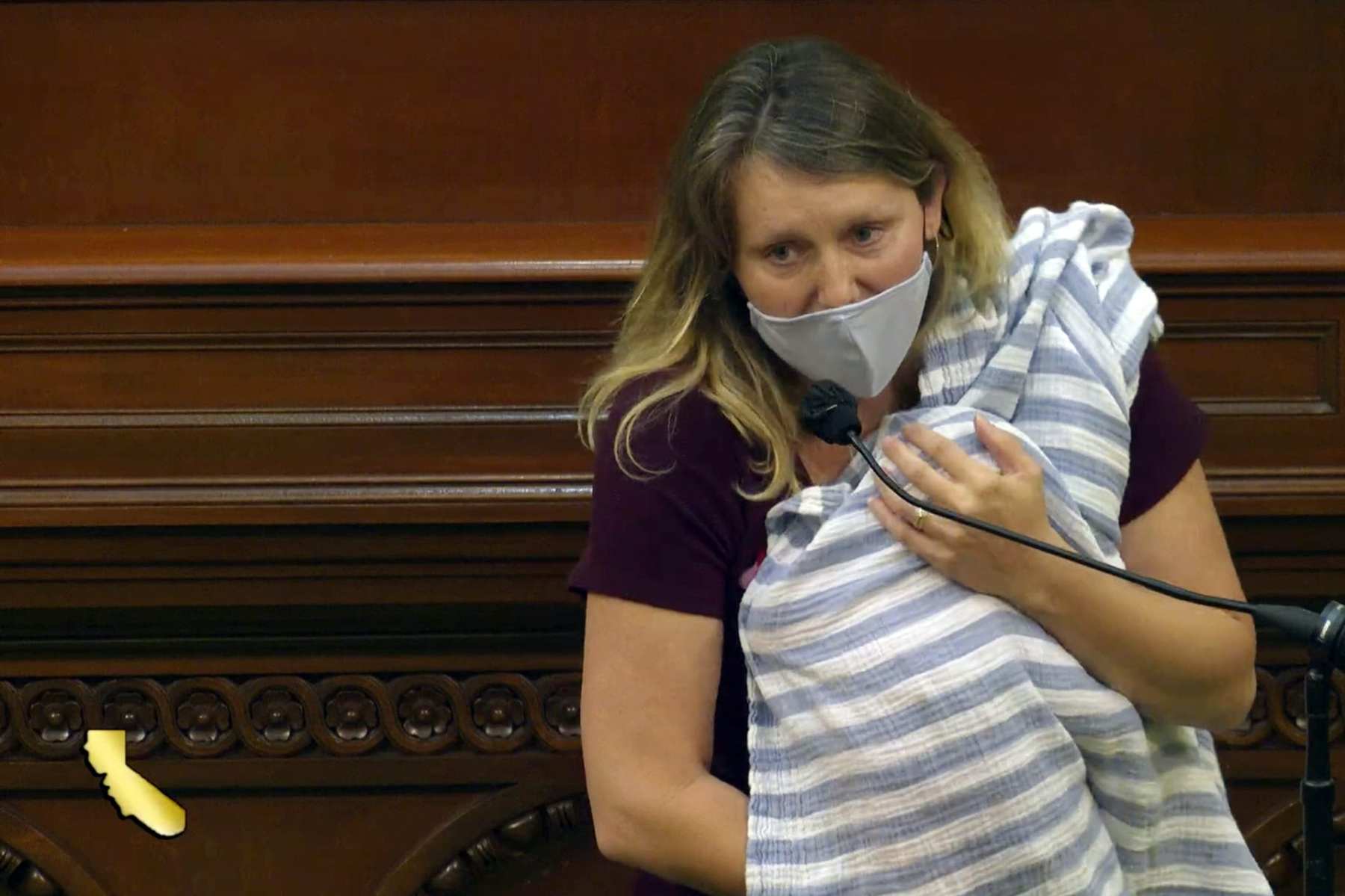Buffy Wicks held her newborn as she stood to speak on the floor of the California State Assembly.
“Please, please, please pass this bill,” said the masked lawmaker during a short speech on housing legislation, her 1-month-old growing increasingly fussy. “And I’m gonna go finish feeding my daughter.”
Wicks did not intend to bring Elly, her newborn, onto the chamber floor. She tried to avoid bringing her to the Capitol altogether. Wicks requested to vote by proxy two weeks before — which would have allowed someone else to vote on her behalf while she stayed home on maternity leave. She gave birth in late July.
The chamber has rules allowing proxy voting if a lawmaker is at a higher risk for COVID-19. In the California Senate, Republicans were allowed to vote remotely after a lawmaker tested positive for the virus. But Wicks said she was told that maternity leave was not an eligible reason for a proxy vote.
Wicks later reflected on the moment, which was captured on video Monday night and ricocheted around social media for the rest of the week, a growing public outrage over the assemblymember having to bring her baby to work during a pandemic. Several news reports followed. Hillary Clinton tweeted about it.
“Any working mom has been in this situation, right? Your daughter’s crying. She’s hungry. She’s wondering why she’s not eating,” said Wicks, a Democrat, to The 19th. The mother of two had wanted to give remarks “and get off the floor and get back to her.”
Wicks is the latest in a long list of mothers in elected office who have challenged outdated notions around parenthood, leading in some cases to policy changes. Her experience may also preview new challenges in statehouses around the country during the pandemic.
Brittany Pettersen, a Democratic state senator in Colorado, gave birth to a boy in early January. As one of the first lawmakers in the statehouse to give birth while serving in office, she openly questioned why the Legislature had no maternity leave policy.
With the support of legislative leadership, Pettersen went on a short leave. But she had to characterize her maternity leave as a chronic illness to get paid.
“I was stunned,” said Pettersen, who is also a vocal supporter of legislation to expand paid family and medical leave in the state.
Pettersen plans to introduce legislation that would allow lawmakers to take paid maternity leave, which she explained as her son cooed loudly in the background.
“It’s not a chronic illness,” she said of her experience. “I was having a baby. And there should be a policy in place in our workplace.”
Earlier this year, Josie Raymond became the first representative in the Kentucky statehouse to give birth while serving in office. The Democrat brought her newborn daughter onto the chamber floor and to legislative meetings. Legislative leadership there had approved her requests for an aisle seat and a private nursery room nearby so she could better balance work and having her newborn close (with the help of a nanny).
But when Raymond’s legislative colleagues asked leadership on her behalf about whether she could do proxy or remote voting, she said they quickly shut down the subject — there was no precedent for it, she and her colleagues were told. So Raymond brought her baby in for floor votes. Several weeks later the pandemic hit, and lawmakers approved remote voting for all.
“It’s these things that they tell us. ‘Oh, we can’t possibly ever make that happen.’ And then when it’s someone else’s necessity, suddenly it happens,” she said.
Mothers have challenged legislative policies in all levels of government. The city council in Eau Claire, Wisconsin, in 2017 banned children from their dais, the sitting area among council members. Councilwoman Catherine Emmanuelle said the vote came after she asked to breastfeed her son at the dais during meetings. A year later, after several members lost re-election, a new council overturned the ban.
Emmanuelle, who is now vice president of the council, said legislative bodies have the power to be more flexible, especially during the pandemic.
“One thing I think is really interesting that COVID has taught us is while it’s not always ideal to work with your kids it is possible. And so we’re throwing this dichotomy out the window of, ‘You can only do one or the other. You can do both.’” she said. “And the employer or, in this case, the legislative body, has the ability to say, ‘Let’s be flexible and meet people where they’re at.’ So that we open up the doors for anybody to serve in elected office, versus creating barriers.”
In 2018, a newly elected U.S. Sen. Tammy Duckworth made headlines by becoming the first U.S. senator to bring her newborn onto the chamber floor as she cast a vote. That was only possible after she pushed the Senate to change a longstanding rule that prohibited children on the chamber floor.
Years earlier, when Duckworth served in the U.S. House and was pregnant with her first child, Democratic leadership denied her request to vote by proxy. Duckworth was eight months pregnant at the time.
A’shanti F. Gholar is president of Emerge, the national organization that trains Democratic women to run for office. She said what happened to Wicks in California highlights how women face obstacles in fighting for equal representation in state government.
“When they created our democracy, and elected positions, they never anticipated for women to be a part of that,” Gholar said. “They never anticipated for people of color to be a part of that. So it goes back to the fact that we are playing in a system that was not built for us. So, is it shocking when these things happen? Yes. But is it really shocking? No, because they never imagined us being involved.”
Women have traditionally waited until their children are older to run for office. That has shifted in recent years, with more women entering office as the mothers of young children or having children while serving in office.
That means legislative leaders need to be proactive in making legislative policies more family friendly, said Simona Grace, the founder of Moms in Office, a political action committee that works to elect mothers.
“Do we really have to wait for these instances to occur?” Grace said, referring to what happened to Wicks. “Or can we actually make some conscious and intentional steps so we’re being more welcoming toward women?”
In at least 35 states, the U.S. Virgin Islands, Guam and Puerto Rico, legislative chambers have introduced or enacted bills or resolutions related to their legislative operations in response to COVID-19, according to the National Conference of State Legislatures. Some of those policies include remote meetings and vote by proxy, though there are some limitations due to state constitutions. A similar policy to vote by proxy in the U.S. House has led to litigation.
It’s unclear how many statehouse policies over voting and meetings will extend into the new year as the pandemic continues. Raymond, the Kentucky representative, has been participating in interim legislative meetings remotely during the pandemic. A mother of three, she was the first candidate in the state to get approval to use campaign funds to pay for childcare, which remains an ongoing challenge in other states. She’s waiting to see what happens with remote legislative meetings and voting in a few months and whether child care and school will be available.
“I’m already feeling a little panicked thinking, ‘What am I going to do with them? Am I going to take them to the Capitol when I go back in January?” she said.
Wicks said she made the trip from her home in Oakland to the state Capitol in Sacramento because it was the final day of session on Monday. She wanted to ensure that certain bills advanced, including a bill that would make it easier to create multi-unit housing. She wanted to do her job.
“I think it struck a chord with people in that women across the country, while maybe they haven’t been on the floor of the assembly with their newborn, they’ve been in a situation. Or they’ve had to manage being a mom and being a career person or going to their job or dealing with those countervailing pressures,” she said.
There is still emerging data around the health effects of COVID-19 on pregnant people, who might be at an increased risk for severe illness, according to the Centers for Disease Control and Prevention.
Stephen Patrick, director of the Center for Child Health Policy at Vanderbilt University Medical Center, said when pregnant people become severely ill with COVID-19, they may have to deliver early.
At least one other Democratic lawmaker in the California statehouse, Assemblymember Monique Limón, is pregnant and was at the state Capitol to vote on Monday. She did not request a proxy vote.
“For newborns, the risk appears to be much lower,” Patrick said in an email. “But parents, regardless of if they are legislators or not, should not be forced to expose their newborns to COVID-related risks. Being a new parent is hard.”
Patrick added: “Bottom line, we should be protecting both pregnant and parenting women.”
Both Wicks and Limón are members of the California Legislative Women’s Caucus. On Wednesday, the group released a statement vowing to make recommendations to legislative leadership in both chambers to “improve internal policies for women in the Legislature.”
“This event was a difficult reminder of what women experience every day in all work environments — and the Legislature is clearly no exception,” according to the statement. “We must do better.”
Assembly Speaker Anthony Rendon, a Democrat, denied Wicks’ request to vote by proxy. His spokesperson, Katie Talbot, initially defended Rendon in a statement that read in part, “The house resolution pertaining to proxy voting is very specific, in that only members at a higher risk from Covid-19 will be considered eligible for proxy voting. This bar of eligibility was always intended to be high, to ensure the protection of our legislative process.”
On Tuesday, Rendon apologized, noting: “Inclusivity and electing more women into politics are core elements of our Democratic values. Nevertheless, I failed to make sure our process took into account the unique needs of our Members. The Assembly needs to do better. I commit to doing better.”
Wicks said she intends to push for new vote by proxy accommodations in the California statehouse around not just lawmakers’ children, but others in their households with compromised immune systems. Women are often primary caregivers for aging parents.
“My hope is that coming out of this, we can redefine that policy,” she said.
The vote that Wicks cast on the housing bill was bittersweet. It failed in the Senate on a technicality. But Wicks was the deciding vote on a separate bill to expand family leave in the state.
“I don’t know if that’s ironic or serendipitous,” she said. “That is exactly why it’s very important that you have people with different diverse life experiences at the table when these decisions are being made, including moms who have young kids. Because moms who have young kids are going to vote for expanded family leave. Because we’re living it and breathing it every single day.”






